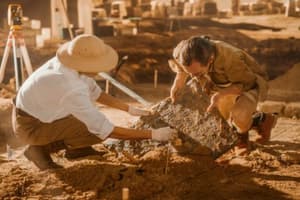Podcast
Questions and Answers
Which of the following best describes coin collecting?
Which of the following best describes coin collecting?
- Collecting coins for their artistic value (correct)
- Collecting coins for their historical significance
- Collecting coins for their mint errors
- Collecting coins for their bullion value
What is the main difference between coin collecting and numismatics?
What is the main difference between coin collecting and numismatics?
- Coin collecting focuses on the historical significance of coins, while numismatics studies currency as a whole
- Coin collecting focuses on the mint errors of coins, while numismatics studies currency as a whole
- Coin collecting focuses on the artistic value of coins, while numismatics studies currency as a whole (correct)
- Coin collecting focuses on the bullion value of coins, while numismatics studies currency as a whole
What factors determine a coin's value?
What factors determine a coin's value?
- Artistic value, grade, and rarity
- Grade, rarity, and popularity (correct)
- Historical significance, mint errors, and popularity
- Bullion value, grade, and rarity
What do commercial organizations offer in relation to coin collecting?
What do commercial organizations offer in relation to coin collecting?
What evidence suggests that coins were collected in ancient civilizations?
What evidence suggests that coins were collected in ancient civilizations?
Which country did Gandhi lead a successful campaign for independence from British rule?
Which country did Gandhi lead a successful campaign for independence from British rule?
What is the meaning of the honorific Mahātmā, which was applied to Gandhi?
What is the meaning of the honorific Mahātmā, which was applied to Gandhi?
Where did Gandhi train in law before becoming a lawyer?
Where did Gandhi train in law before becoming a lawyer?
In which country did Gandhi first employ nonviolent resistance in a campaign for civil rights?
In which country did Gandhi first employ nonviolent resistance in a campaign for civil rights?
At what age did Gandhi become a lawyer?
At what age did Gandhi become a lawyer?
Flashcards are hidden until you start studying
Study Notes
Coin Collecting
- Coin collecting is the hobby of collecting and studying coins, often with the goal of assembling a collection of coins from around the world.
- Numismatics is the study of coins, but it is more focused on the academic and historical aspects of coins, whereas coin collecting is more recreational.
Coin Value
- A coin's value is determined by factors such as its rarity, condition, demand, and mintage.
Commercial Organizations
- Commercial organizations, such as coin dealers and auction houses, offer services such as buying, selling, and appraising coins for collectors.
Ancient Coin Collecting
- Evidence suggests that coins were collected in ancient civilizations, such as ancient Greece and Rome, where coins were seen as a form of art and a symbol of wealth.
Mahatma Gandhi
- Mahatma Gandhi led a successful campaign for independence from British rule in India.
- The honorific Mahātmā, which means "great soul," was applied to Gandhi in recognition of his high moral principles and his commitment to nonviolent resistance.
- Gandhi trained in law in London before becoming a lawyer.
- Gandhi first employed nonviolent resistance in a campaign for civil rights in South Africa.
- Gandhi became a lawyer at the age of 22.
Studying That Suits You
Use AI to generate personalized quizzes and flashcards to suit your learning preferences.




